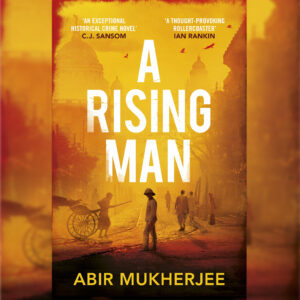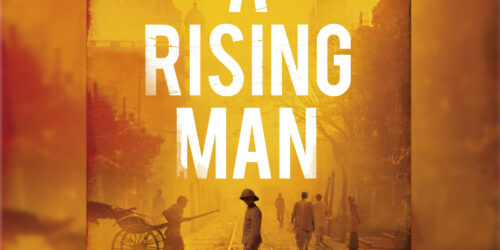
Over April and May our (virtual) NCW Book Club is A Rising Man by Abir Mukherjee. We hope you’ll join us in reading the book and joining the conversation – find out more about all the ways that you can get involved.
 A Rising Man follows Captain Sam Wyndham as he arrives in Calcutta (now Kolkata) from Scotland Yard. A newcomer to India under British occupation and not fitting in with either Indian or British expatriate societies, Sam must try to solve the murder of a high-ranking British official while navigating life in a new place. The unique perspective of this character allows Abir Mukherjee to explore issues of colonialism, class and the aftermath of war in a way that challenges the single story of dominant histories, as well as making a gripping read.
A Rising Man follows Captain Sam Wyndham as he arrives in Calcutta (now Kolkata) from Scotland Yard. A newcomer to India under British occupation and not fitting in with either Indian or British expatriate societies, Sam must try to solve the murder of a high-ranking British official while navigating life in a new place. The unique perspective of this character allows Abir Mukherjee to explore issues of colonialism, class and the aftermath of war in a way that challenges the single story of dominant histories, as well as making a gripping read.
Here we share a writing exercise inspired by A Rising Man that we hope will open up further ideas for composing your own piece of writing, whichever form or genre you’re writing in. It’s an exercise in three parts, and you can do as much or as little of it as feels useful to you. It will be well suited to fiction writers, but may also be helpful to poets and non-fiction writers.
Let us know how you get on over on our Discord community. Happy writing!
Writing exercise: perspectives on place
Step one: a sense of place
This first part of the exercise can be considered an exercise in itself, and is well worth trying for its own sake. You can spend as long as you like on this exercise, though it will take a minimum of about twenty minutes. It can go on to become fiction, non-fiction or poetry, and any genre – crime, fantasy, historical, realism, whatever you feel drawn to.
- Think of a place you know well, and write a description of it with as much detail as you can. You may want to engage all of the senses (sight, sound, taste, smell, touch) as well as considering the history and geography of the place. If you would like to write about an imagined or fantastical place, start off with somewhere real that you are very familiar with so that you can ground your work in these specific details, and then move it into your imagined place in the next draft. If you enjoy drawing maps for your stories, this is a great chance to do so.
- Who are the people who habitually might find themselves in this place? Can you identify three different people? Describe them – what clothes do they wear, what activities or jobs do they do, what opinions and hopes do they hold? How do they move within or through this place – are they lingering leisurely or are they hurrying to get to somewhere else?
- Finally, make a few notes about how your three people feel within this place. What emotions do they have, and what does each one of them notice, care or worry about in this space? For example, in a park, the passerby walking their dog feels differently to the parent who is watching their child in the playground, and the child will notice completely different things compared to their parent.
Step two: a new perspective
Now that you have your sense of place, it’s time to bring in a newcomer’s perspective for a fresh look at your familiar scene. This part is ideally suited to fiction, but can be adapted to non-fiction or poetry, too.
- Look at your list of three people who go to or move through your chosen place. Now think of a fourth person who has been missing from or overlooked within this scene so far. Perhaps they are new to this place, or perhaps they have been away for a long time and have now returned. Or maybe they’ve always been here, but for some reason need to move secretly within this place. Describe this person as you described your first three characters, including what they notice or care about within the place.
- You may wish to think back to a time when you have visited somewhere unfamiliar. How did it feel? How did you find your way, and what did you notice about the place? What did you see, hear, taste, smell, and touch? Can you use one or more of the specific details of your own experiences in writing about your new character or viewpoint?
Step three: putting it all together
Once you have described your place and your new character separately, it’s time to put them together. Can you describe the place and its inhabitants through your new (character’s) perspective? Here are a few ideas to help you, and while some are best suited to fiction, they might also help with non-fiction or poetry.
- Try writing in a different person. If you have written about the familiar place in the 3rd person, try shifting into the first, or vice versa. This simple change will help you change from how you see the place to how your new character/persona might see it.
- Return to your original description of the place, and compare it to what your character feels and notices within it. Copy your original description, but take out anything that you character wouldn’t experience, know, or notice.
- How can you edit the original description of place to better reflect your character’s voice? What tone and pace would they use – are they in a reflective, meandering mood, or are they a busy fast talker? Play around with your sentence structure to get further into how your character experiences this place.
- If you want to take it further – how do the different occupants of your chosen place interact with and feel about each other? How might they meet, and which of their traits might make them objects of curiosity for the others? From this you can craft a situation that brings two or more of your characters together, or keeps them apart, and voila – you have the basis for a new story.
Image: Afzal Kahn, Pexels
You may also like...
A Change in the Air
Abir Mukherjee delivers a powerful essay on growing up in the UK as a child of Indian immigrants, Britain’s relationship to its colonial history, and what drives him to write.

26th May 2021
A Rising Man: Questions for readers
Abir Mukherjee’s historical crime novel is our current NCW Virtual Book Club pick

16th April 2021
NCW Book Club: A Rising Man by Abir Mukherjee
Join us and share your passion for reading

7th April 2021






